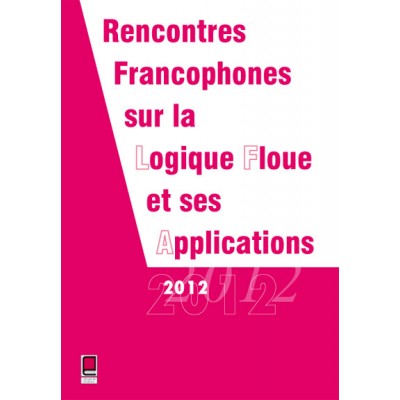Tout ce que vous avez toujours voulu savoir sur les variables aléatoires flous (sans jamais oser le demander)
Depuis l'introduction de la notion de variable aléatoire
floue dans les années 70 par Féron, de nombreux travaux
ont proposé différentes extensions des notions probabilistes
et statistiques usuelles au cadre des variables
aléatoires floues. Nous présentons ici le concept de
variable aléatoire floue en mettant l'accent sur l'aspect
sémantique plutôt que sur l'aspect formel.
Nous rappelons d'abord les différentes interprétations
d'un ensemble flou proposées dans la littérature, qui
serviront ensuite de base pour comprendre les différentes
applications possibles des variables aléatoires floues.
Nous introduisons ensuite le concept de variable aléatoire
floue, en commençant par le cas particulier et mieux
connu des ensembles aléatoires. Les ensembles aléatoires
et les variables aléatoires floues peuvent représenter
soit un phénomène aléatoire où les observations sont
des ensembles (flous), soit le résultat d'une expérience
classique dont le résultat est observé de manière
imprécise. Selon le cas, le traitement des ensembles
flous aléatoires sera différent. Les notions probabilistes
basiques (espérance, variance, indépendance stochastique,
etc.) et les techniques d'inférence statistique
(tests d'hypothèse, classification, etc.) se généralisent de
manières différentes selon l'interprétation adoptée.
Since the notion of fuzzy random variable was introduced
by Féron in the 70s, many works have been published
extending various notions and results of Probability
Theory, as well as different techniques in Statistical
Inference. This talk presents the concept of fuzzy random
variable, with more emphasis on the semantics than
on the formal mathematical aspects.
We begin by recalling the different interpretations of
fuzzy sets in the literature, as a basis for understanding
the various fields of application of fuzzy random variable.
Next we will introduce the concept of fuzzy random variable,
starting with the particular and better known case
of random set. Random sets and fuzzy random variables
can represent either random phenomena where the outputs
are (fuzzy) sets or ill-perceptions of random experiments
with numerical outputs. Depending on the interpretation
and application of the fuzzy random variable,
the treatment is different. The basic concepts in probability
(the notions of expectation, variance, stochastic independence,
etc.) and techniques of statistical inference
(hypothesis testing, classification, etc.) are extended in
different ways depending on the specific interpretation of
the data.

